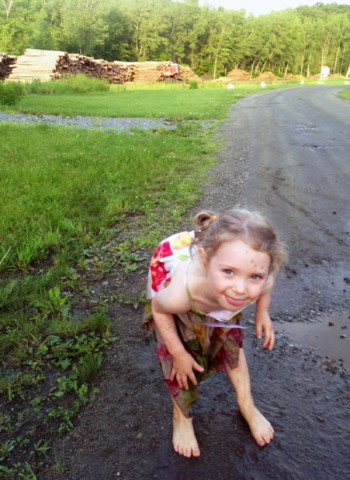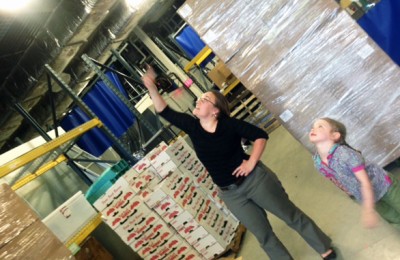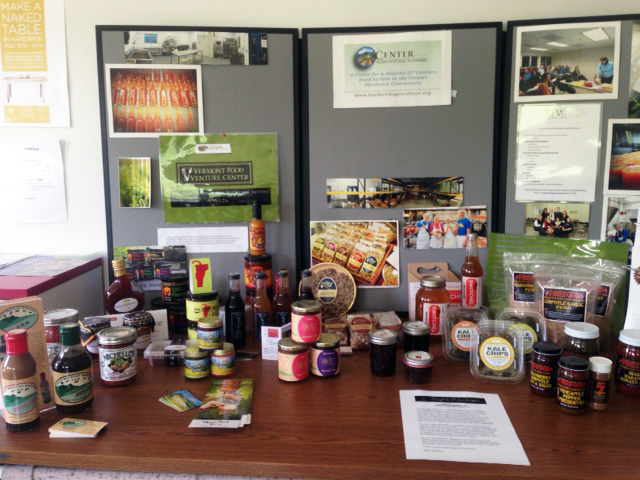
Naia enjoying all that Hardwick had to offer–especially the mud!
The day ended as all good ones do, with my daughter in a puddle, covered in mud. She was my wingman for an event hosted by Vermont Businesses for Social Responsibility in a long-targeted destination of Hardwick, Vermont.
For those of you who haven’t heard of it, Hardwick is one of the blossoming epicenters of agritourism in Vermont. It emerged years ago, powered by some local folk who had a few interesting challenges and that New England sensibility about waste.
High Mowing Organic Seeds, now a global supplier, was growing organic seeds for producers and actually had food as a by-product. The local milk farms had whey from their cheese making industry and not enough pigs to consume it. A local apiarist (beekeeper) had the itch to do something more with his honey. Fortunately, all these people knew each other and began looking for ways to put their “waste” to good use.
And so, in bits and pieces, through personal relationships already established, dozens of locally-rooted businesses have emerged in the Hardwick area that put these agricultural products to good use. In the process, they are also creating solid local jobs and bringing a valuable income to the region. At the heart of it all is the Center for an Agricultural Economy. The Center, as Director Sarah Waring described, works with twenty-seven local businesses, delivers programs to educate other aspiring communities, works as a co-packers for specialty food and value-added farm products, and serves as a local community food production kitchen.

Naia and Sarah Waring of the Center for an Agricultural Economy explore some of the Center’s facilities
In addition to Vermont Soy, Vermont Natural Coatings, Jasper Hill Cheese, High Mowing Organic Seeds, Caledonia Spirits, Hill Farmstead Brewery, Claire’s Restaurant, and more, the local schools are involved in agriculture. Hardwick’s elementary school is proactive with its school gardens and local purchasing, and students take field trips to local businesses. The high school combines student learning with actual experience in the kitchen chopping and processing vegetables. All of this work is built on the decades of farming which is a part of the Vermont and New England culture—a backbone of strong dairy farms, hardworking food producers, and families who have made a living with the land.
Of course, even an agricultural economy achieving this level of success has some challenges. For one thing, while its rural location is convenient for farmers and producers, it presents difficulties for specialty food producers that have to ship their products to market and farmers who want to aggregate. Secondly, because the kitchen facility at the Center for an Agricultural Economy relies on small businesses and farmers—all of whom have their own challenges with capital or with weather—the Center’s model for sustainability is still being tested. A third challenge is the low price point that massive economies of scale have achieved for industrialized, institutionalized, conventional food. As Hardwick tries to rebuild an agricultural economy with fair prices for everyone, there’s not a lot of margin to go around. Consumers need to be aware of these differences and know why they are important.
Despite these challenges, there is a hustle and bustle in downtown Hardwick and a high Terroir culture. Most importantly, perhaps, people are visibly proud. Active consideration of both the people who inhabit this village and the place from which their business resources arise is evident throughout their collective decision making process.
As we at the Institute connect to our neighbors to understand how to enable embedding values into business and business into values, Hardwick stands as a prime example from which any community can take away the following articulated lessons:
- Treat people well, because you’ll be seeing them again and again
- Piles of waste are wasteful and damaging—find something useful to do with them
- You’ll get a lot farther working together
- Use the resources at hand (people and place-based)—find the opportunity
- Don’t overtax your assets if you don’t plan on moving—they’re all you’ve got
Importantly, as the conditions of their community change, be it more tourists for their restaurants or more consumers for their products, Hardwick businesses have taken the time to ensure that they serve their home and each other, as well as their customers.

A display of local agricultural products produced in and around Hardwick, Vermont







